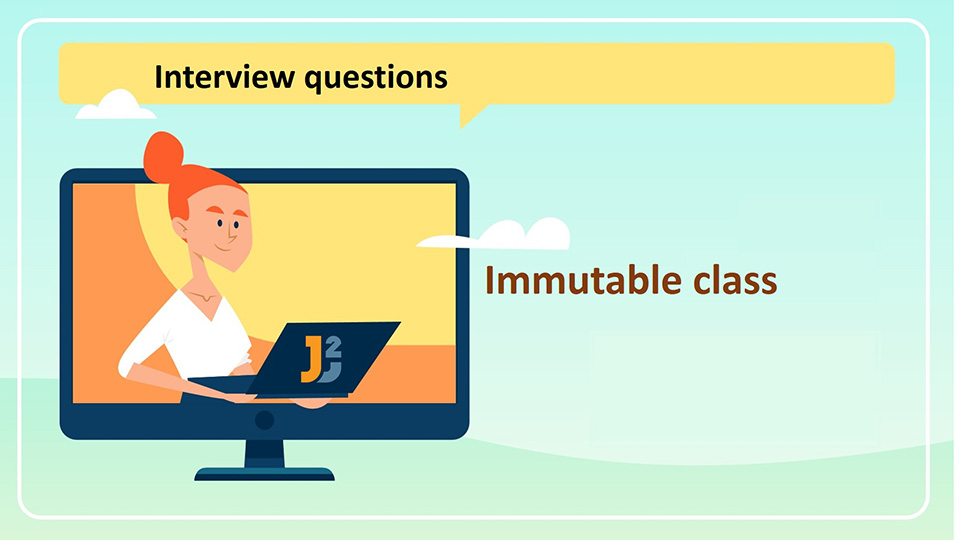Table of Contents
- 1. What is immutable class?
- 2. What are steps for creating an immutable class?
- 3. Can you answer if below Employee class is immutable or not? If not what will you do to make it immutable?
- 4. Can you provide example of immutable class?
- 5. Do immutable classes thread safe? If yes then how?
- 6. What precautions you need to take if you are working with mutable instance variables?
- 7. Why immutable objects are considered to be good keys for HashMap?
- 8. Can you give some good examples of immutable classes?
Here I am providing some important immutable class interview questions with answers.
1. What is immutable class?
Answer : Immutable objects are those objects whose state can not be changed once created. Class whose objects possess this characteristic can be termed as immutable class.
For example : String , Integer.
2. What are steps for creating an immutable class?
- Make your class final :
If you make your class final, no class will be able to extend it, hence will not be able override methods of this class. - Declare all instance variable with private and final :
If you make instance variable private, no outside class will be able to access instance variables and if you make them final, you can not change it. - Say no to setter methods :
Don’t create setter method for any instance variables, hence there will be no explicit way to change state of instance variables. - Initialize all variables in constructor :
You can initialize variables in constructor. You need to take special care while working with mutable object. You need to do deep copy in case of immutable objects. - Perform cloning of mutable objects while returning from getter method:
If you return clone of object from getter method, it won’t return original object, so your original object will remain intact.
Read : Why String is immutable in java
3. Can you answer if below Employee class is immutable or not? If not what will you do to make it immutable?
|
1 2 3 4 5 6 7 8 9 10 11 12 13 14 15 16 17 18 19 20 21 22 23 24 25 26 |
package org.arpit.java2blog.bean; import java.util.ArrayList; public final class Employee { private final String name; private final ArrayList addresses; public Employee(String name, ArrayList addresses) { super(); this.name = name; ArrayList tempAdd=new ArrayList(); for (int i = 0; i < addresses.size(); i++) { tempAdd.add(addresses.get(i)); } this.addresses = tempAdd; } public String getName() { return name; } public ArrayList getAddresses() { return addresses; } } |
|
1 2 3 4 5 |
public ArrayList getAddresses() { return (ArrayList) addresses.clone(); } |
4. Can you provide example of immutable class?
|
1 2 3 4 5 6 7 8 9 10 11 12 13 14 15 16 17 18 19 20 21 22 23 24 25 26 27 28 29 30 31 32 33 34 |
package org.arpit.java2blog.bean; import java.util.ArrayList; public final class Country { // declared private final instance variable private final String countryName; // Mutable object private final ArrayList listOfStates; public Country(String countryName, ArrayList listOfStates) { super(); this.countryName = countryName; // Creating deep copy for mutable object ArrayList tempList = new ArrayList(); for (int i = 0; i < listOfStates.size(); i++) { tempList.add(listOfStates.get(i)); } this.listOfStates = tempList; } public String getCountryName() { // Do not need to do cloning as it is immutable object return countryName; } public ArrayList getListOfStates() { // Returning cloned object return (ArrayList) listOfStates.clone(); } } |
5. Do immutable classes thread safe? If yes then how?
Immutable classes are thread safe because you can not change state of immutable objects, so even if two thread access immutable object in parallel, it won’t create any issue.
6. What precautions you need to take if you are working with mutable instance variables?
If you are working with mutable instance variable(addresses list in above Employee class) then do following:
- Do deep copy mutable variable in constructor.
- Return clone of instance variable from getter of that instance variable rather than actual variable.
7. Why immutable objects are considered to be good keys for HashMap?
Answer : Immutable object’s hashcode won’t change, so it makes key retrieval faster as you can cache different hashcode for different keys. In case of mutable object, hashcode may be dependent on mutable fields, if any value for these field changes, it might change hashcode, so you might not able to find your key in HashMap as hashcode is different now.




Hi Arpit, great article. Should you use also clone() for deep copy of arraylist ? For this line:
tempList.add(listOfStates.get(i))? Or you are assuming that list is a list of Strings? Thanks
Hi Goran,
I am assuming that list is a list of Strings. As String is immutable in java, you don’t need to use deep copy for ArrayList.
Thank you!!